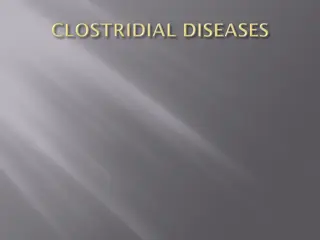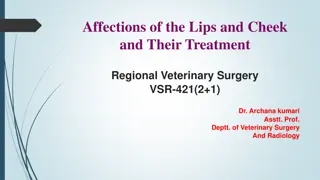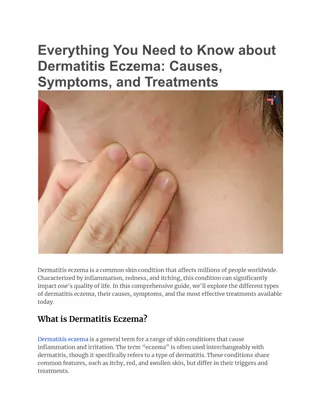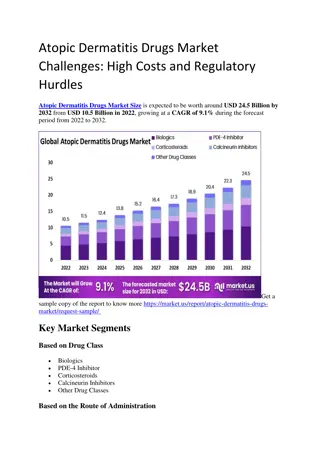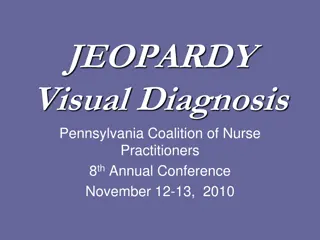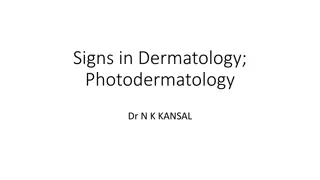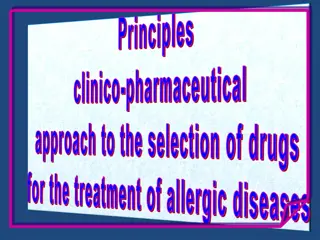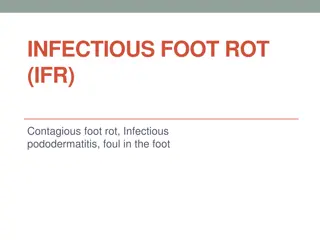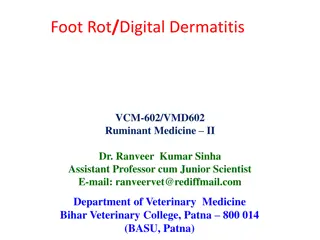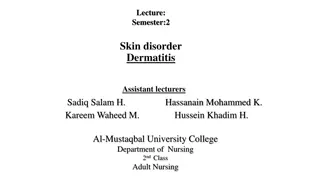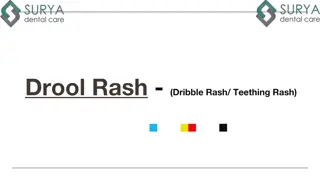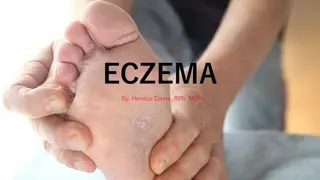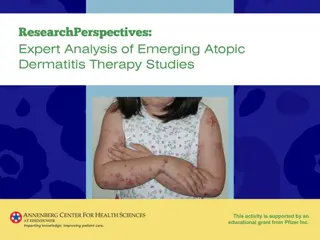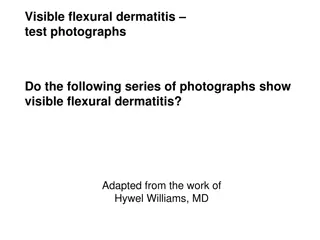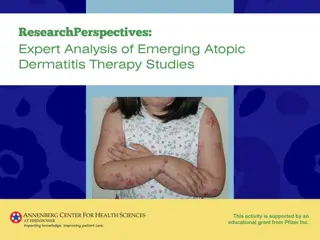Overview of Clostridial Diseases Caused by Clostridium Bacteria
Clostridial diseases are caused by bacteria of the genus Clostridium, which are anaerobes commonly found in soil, feces, and healthy animal tissues. These bacteria can lead to various diseases in animals such as black quarter, gas gangrene, necrotic dermatitis, and more. Understanding the different
0 views • 55 slides
Understanding Dermatitis: Causes, Types, and Prevention in Hair & Beauty Salons
Dermatitis is a common skin condition caused by irritants or allergens. It can be triggered by various substances in hair and beauty salons, leading to redness, itching, and other symptoms. Hairdressers and beauty therapists need to be cautious to prevent dermatitis by avoiding frequent contact with
1 views • 19 slides
Veterinary Approaches to Lips and Cheeks Afflictions
Addressing various conditions affecting the lips and cheeks of animals, including open wounds, hare lip, retraction, dermatitis, tumors, cysts, and more. Treatments range from surgical interventions to topical applications for ulceration and retraction.
0 views • 10 slides
Everything You Need to Know about Dermatitis Eczema_ Causes, Symptoms
In this comprehensive guide, we\u2019ll explore the different types of dermatitis eczema, their causes, symptoms, and the most effective treatments available today.
0 views • 6 slides
Discovering the Fascinating World of Skin Anatomy and Terminology
Uncover the intricacies of the integumentary system, exploring the functions and anatomy of our skin. Delve into skin root words, suffixes, and terms like dermatitis and keratoderma, learning about skin conditions and their meanings. Enhance your medical terminology knowledge with engaging visuals a
0 views • 7 slides
Understanding Systemic Steroids and Pulse Therapy in Dermatology
Systemic steroids, potent immunosuppressive and anti-inflammatory agents, play a crucial role in dermatological therapy. This article discusses the pharmacology, mechanism of action, cellular effects, and clinical applications of glucocorticoids. It covers topics such as cortisol synthesis, glucocor
0 views • 30 slides
Healthcare Laws and Regulations Quizzes
This content provides quizzes related to healthcare laws, regulations, and best practices. Topics include reporting communicable diseases, control measures for occupational exposure, handling dermatitis in healthcare settings, definitions of healthcare organizations, and OSHA requirements for Hepati
2 views • 42 slides
Atopic Dermatitis Drugs Market
Atopic Dermatitis Drugs Market Size\u00a0is expected to be worth around\u00a0USD 24.5 Billion by 2032\u00a0from\u00a0USD 10.5 Billion in 2022, growing at a\u00a0CAGR of 9.1%\u00a0during the forecast period from 2022 to 2032.
2 views • 4 slides
Pediatric Dermatology Guide for Nurse Practitioners
Explore visual diagnosis challenges from the Pennsylvania Coalition of Nurse Practitioners' annual conference in 2010, covering topics such as neonatal acne, seborrheic dermatitis, and eczema/atopic dermatitis in infants. Enhance your knowledge on common skin conditions affecting newborns and learn
0 views • 63 slides
Veterinary Parasitology: Flea & Lice Overview
Explore the world of veterinary parasitology with a focus on fleas and lice. Dive into topics such as the life cycle of fleas, their preferred habitat, pathology concerns, and Flea Allergy Dermatitis. Learn about identifying stages in the flea life cycle, common flea species, and how to manage Flea
0 views • 16 slides
Schedule of Ratings for Skin Conditions in CFR 38.4.118
This document outlines the Schedule of Ratings for various skin conditions, including burn scars, dermatitis, leishmaniasis, lupus, tuberculosis luposa, dermatophytosis, bullous disorders, skin neoplasms, infections, collagen-vascular diseases, and more. It provides detailed descriptions and classif
0 views • 16 slides
Dermatological Signs: Recognizing Skin Disorders
Learn about key dermatological signs such as the Nikolsky sign, Casals necklace, NF1 Button hole sign, Crowe sign, and Carpet tack sign. Understand the visual indicators of various skin disorders like immunobullous disorders, pellagra dermatitis, and dermatomyositis. Enhance your knowledge in dermat
0 views • 30 slides
Common Skin Findings in Outpatient Setting
Pityriasis Rosea is a benign viral exanthem presenting with a herald patch and generalized eruption, often accompanied by pruritis. Treatment involves reassurance, topical steroids, and oral antihistamines, and usually resolves within 12 weeks. Seborrheic Dermatitis is a papulosquamous disorder char
0 views • 31 slides
Understanding Datura Poisoning: Effects, Management, and Treatment
Datura, a genus of flowering plants, contains toxic alkaloids like scopolamine and atropine, causing severe symptoms ranging from dermatitis to hallucinations. Identifying datura seeds versus chili seeds, distinguishing signs of poisoning, managing fatal doses, and treatment methods like purgatives
0 views • 22 slides
Understanding Oil & Grease Dermatitis in Mechanical Workers
Occupational skin problems, such as oil and grease dermatitis, affect mechanical workers due to continuous exposure to oils, grease, solvents, and chemicals. Workplace risk assessments and good hand care practices are essential for prevention. Treatment includes identifying causes and implementing a
0 views • 7 slides
Understanding Cutaneous Manifestations of HIV and AIDS
Human Immunodeficiency Virus (HIV) is a lentivirus that infects CD4 T lymphocytes, leading to Acquired Immunodeficiency Syndrome (AIDS). Cutaneous manifestations of HIV/AIDS vary depending on the stage of infection and CD4 T cell counts. Early signs include exanthem, oral hairy leukoplakia, candidia
0 views • 17 slides
Understanding Allergies in Today's Society
Allergy is a prevalent health issue affecting a significant portion of the global population due to various factors like environmental changes, lifestyle choices, and genetic predispositions. The rise of allergic diseases, such as allergic rhinitis, conjunctivitis, and dermatitis, poses a challenge
0 views • 81 slides
Comprehensive Overview of Infectious Foot Rot (IFR) in Ruminants
Infectious Foot Rot (IFR) is a contagious disease affecting ruminants worldwide, characterized by severe interdigital dermatitis and lameness. It is caused by Fusobacterium necrophorum and other bacteria, leading to inflammation of the sensitive foot tissues. Various predisposing factors and modes o
0 views • 13 slides
Understanding Foot Rot and Digital Dermatitis in Ruminants
This detailed presentation covers Foot Rot (Bovine Foot Rot) and Digital Dermatitis (DD) in ruminants, discussing the etiology, symptoms, treatment, prevention strategies, and more. Foot Rot is caused by Fusobacterium necrophorum while DD is a contagious disease involving multiple bacteria. Treatmen
0 views • 17 slides
Understanding Fungal Skin Infections and Eczema/Dermatitis
Learn about fungal skin infections like Athlete's foot and ways to manage them, including symptoms, treatment options, and when to seek medical attention. Additionally, explore common skin conditions such as eczema and dermatitis, their causes, and typical symptoms in this informative guide.
0 views • 34 slides
Understanding Dermatitis: Causes, Types, and Clinical Manifestations
Dermatitis is a common skin disorder characterized by inflammation, itching, redness, and skin lesions. This article explores the etiology, types (such as contact dermatitis and atopic dermatitis), and clinical manifestations of dermatitis, including acute and chronic phases. Learn about the risk fa
0 views • 17 slides
LI NAPNAP Chapter Meeting Agenda at Blackstone Steakhouse
A detailed agenda of the LI NAPNAP chapter meeting at Blackstone Steakhouse featuring topics on novel prescription options for atopic dermatitis, Pfizer Pharmaceuticals' informational program, partnerships for vulnerable youth, community service projects, scholarships, and more.
0 views • 15 slides
Preventing and Treating Drool Rash
Drool rash is a type of contact dermatitis in babies caused by the contact of saliva with the skin. Drool rash is also called Teething rash and Dribble rash. For more info visit: \/\/ \/drool-rash-in-babies-how-to-prevent-and-treat-it\/
3 views • 10 slides
Understanding Eczema: Causes, Classifications, and Pathogenesis
Eczema, a common skin condition, is characterized by inflammation and disrupting skin homeostasis. It can be classified morphologically and etiologically, with major pathogenesis factors including reduced skin barrier function and abnormal immune response. Atopic dermatitis, a form of endogenous ecz
0 views • 36 slides
Breakout Group Instructions & Case Example on Atopic Dermatitis
Explore breakout group logistics for meaningful discussions on demonstrating the endpoint in atopic dermatitis research. Dive into a case example focusing on measuring scratching activity as a key outcome, highlighting the importance of assessing itchiness in clinical trials.
0 views • 6 slides
Efficacy and Safety of Crisaborole Ointment in Atopic Dermatitis Treatment
This study highlights the effectiveness and safety of crisaborole ointment, a nonsteroidal phosphodiesterase 4 inhibitor, in treating atopic dermatitis in children and adults. The medication showed significant improvement in patients with mild-to-moderate atopic dermatitis, with minimal side effects
0 views • 23 slides
Assessment of Visible Flexural Dermatitis Through Test Photographs
Series of test photographs adapted from the work of Hywel Williams, MD, are analyzed to determine the presence of visible flexural dermatitis. The photographs are labeled as either showing visible flexural dermatitis or not based on visual indications. Images are provided to aid in the assessment pr
0 views • 33 slides
Comparative Analysis of Crisaborole Ointment and Dupilumab in Atopic Dermatitis
Crisaborole ointment, a nonsteroidal PDE4 inhibitor, demonstrated efficacy and safety in the treatment of atopic dermatitis in patients aged 2 years and older. Results from two phase 3 studies showed a significant improvement in disease severity with crisaborole compared to the vehicle. Treatment-re
0 views • 23 slides
